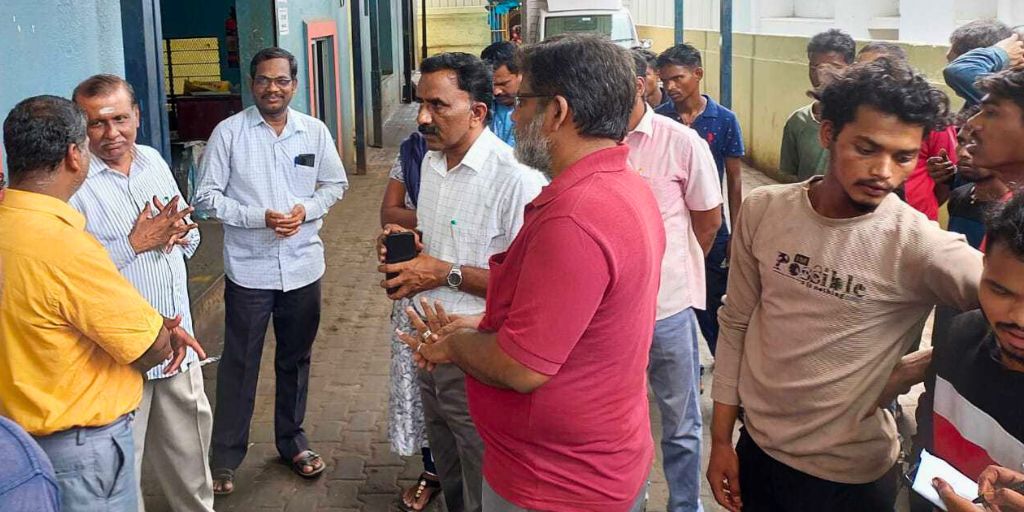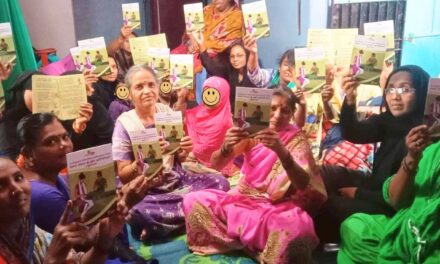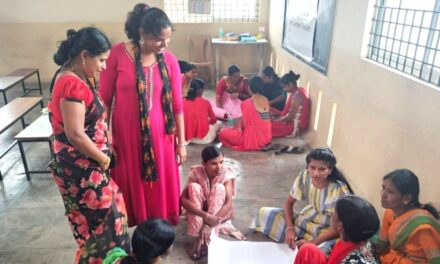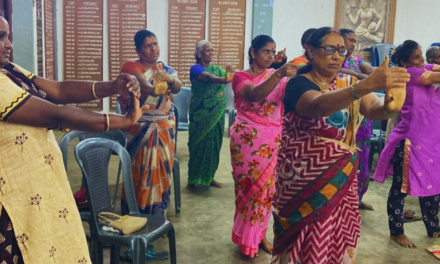Cividep’s Foray Into Running A Labour Helpline in Tamil Nadu Leads To Rescue Of Migrant Workers From Chennai Industrial Unit
For two weeks, Sailesh kept asking Cividep’s Kaliyaperumal Narayanan the same question: ‘Aap kab aaoge?’ (When will you come?) These words were repeated over the course of a fortnight of clandestine phone conversations from his roommate’s mobile. It captured the distress of Sailesh and 10 other men who were forcibly employed at a manufacturing facility in Chennai, Tamil Nadu.
Kaliyaperumal, Cividep’s Worker Training and Research Support Officer and the sole local contact of these migrant workers, didn’t have ready answers. As the co-ordinator of the labour helpline India Labour Line‘s State Facilitation Centre (SFC) in Tamil Nadu, it took him more than a week to find their location, workplace, and employer details. The workers didn’t have any means of escape as they were not being paid wages and their phones were confiscated by the labour contractor at the machinery spare-parts unit.
Help At Hand
The days leading up to their rescue were stressful. “The workers did not know the factory name or address, and I showed them through Whatsapp how they could share their GPS location. Later, they were able to share names of the contractor and the factory – located in Ambattur industrial area, a Chennai suburb,” says Kaliyaperumal.
Armed with these details, Kaliyaperumal and the team took up the issue with a labour advocate, local authorities, and the Labour Department. The response was prompt – within a day a fleet of jeeps and bikes took Ambattur’s Tehsildar and Village Officer (VO), the Revenue Inspector, along with the Cividep team comprising Kaliyaperumal and Project Coordinator Gokhularaj to the factory.
The workers were not to be found there and the Inspector promptly enquired about other units of the same facility. This finally led them to the place where all 11 of the workers – 7 Odiya and 4 Assamese – were found. They were freed, given pending wages, and some of them returned to their native villages in Kandhamal, Odisha, and Assam. The traumatised men have now decided not to migrate for jobs.
An Oft-repeated Story
Stories of being held at workplaces against their will are not that uncommon among migrant workers who travel to metros in search of jobs. Most of them land in big cities hoping for construction and other informal sector jobs, or openings as low-wage workers in the manufacturing sector. In this case, Sailesh and friends were promised jobs by a contractor but once they reached the Chennai Central railway station the person didn’t show up. The workers were desperate enough to take up job offers made by an autorickshaw driver, who solicited them outside the station, and ended up at the Ambattur unit.
More than 90% of India’s workers are employed in the informal sector. Without formal employment contracts, they experience wage theft, delay in payment of wages, and forced labour, and working conditions without recourse to legal support to address grievances.
Way Forward
This is precisely why India Labour Line (ILL) set up the national labour helpline number 1-800-833-9020 to provide free legal aid and mediation services. ILL tele-callers based in Mumbai provide first stage counseling to complainants before transferring cases needing direct intervention to their respective SFCs, currently present in 6 states. Sailesh’s is the first case that came to the Cividep team, which recently started running the ILL’s Tamil Nadu SFC.
Distress calls from the Odisha workers’ families were redirected by the helpline associates first to its Kochi centre, and then later, to Chennai. In the absence of any similar government mechanism, ILL provides information on accessing basic entitlements, connects workers to the police and Labour Department, and helps in approaching the labour courts. Since ILL’s inception more than two years ago, more than Rs. 3 crores of unpaid wages have been recovered.
Through the Chennai SFC, Cividep plans to reach out to workers in and around the city’s industrial belts, and popularise the helpline number. It will provide support in remediating cases involving wage theft, ESI, PF, and compensation for workplace accidents. Though it has been almost a decade of work in the leather and electronics manufacturing sector in Tamil Nadu, this marks the team’s foray into direct mediation and legal support for workers. Through this initiative, Cividep’s focus will go beyond industries that are part of global supply chains, says Programme Lead Pradeepan Ravi. “Grievance redressal in global supply chains is not fully effective. We will be able to see how an initiative like this works and learn from that.”
The work, though challenging, is much needed. “In Chennai, most of the industrial workforce is unorganised. There is an increasing trend towards ‘fixed-term’ employment,” says Kaliyaperumal. This means that workers are employed on short-term contracts, without the security, benefits, and legal recourse that a permanent employee would have. He adds: “Many companies have started terminating staff and reappointing them on short-term contracts to avoid permanent employment.” The team hopes to use the learnings from the SFC to help workers across Tamil Nadu.





